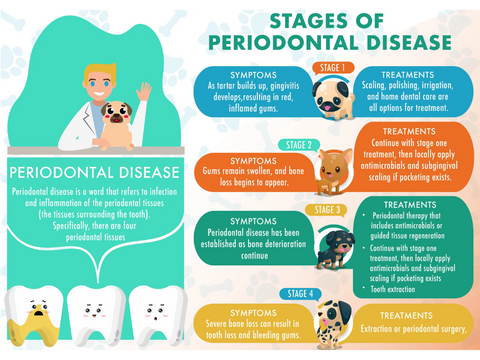Author: Janine DeVault
Periodontal disease (also known as Gum Disease) is a disease that affects a dog’s gums. The disease is caused by bacteria that results from the accumulation of plaque on your dog’s teeth. As bacteria from the plaque begins to spread it can lead to inflamed gums (gingivitis), and when left untreated, it can cause decay in the jawbone and the teeth.
Periodontal disease is one of the most common health afflictions in dogs, affecting 90% of them. The good news is that you can prevent and treat periodontal disease by establishing a consistent oral hygiene routine with your dog. Tooth brushing, dental chews, and regular checkups will all help you keep the implications of gum disease to a minimum in your pet.
Signs and Symptoms of Periodontal Disease in Dogs
Knowing the signs of periodontal disease will help you seek treatment for your dog before the condition becomes severe. Since the symptoms of gum disease aren’t always apparent until the disease is advanced, developing a regular dental hygiene routine is essential.
Here are the symptoms to watch for:
- Red or inflamed gums
- Bad breath
- Loose teeth
- Gum recession
- Bleeding gums
- Missing teeth
- Exposed tooth roots
- Reduced interest in chew toys
Check out this infographic from A Pup Above for more information about the symptoms and stages of periodontal disease: 
How to Prevent Canine Periodontal Disease
Practicing consistent dental hygiene with your dog is the best way to prevent gum disease, tooth loss, and other dental health conditions that might arise. It may seem tedious, but the following practices will protect your dog from painful dental complications and could ultimately save you a lot of money and stress.
Brush your dog’s teeth daily
Yep, dogs need their teeth brushed too! It only takes 24 hours for plaque to accumulate in your dog’s mouth, opening the gates for gum inflammation and the beginnings of periodontal disease. Brushing your dog’s teeth once a day is the best way to ward off gum disease and keep your dog’s teeth in tip-top shape.
Encourage healthy chewing
Not only does chewing strengthen your dog’s jaw and keep them entertained, but it also helps wear down plaque and stimulates the secretion of saliva which has natural antimicrobial qualities. While chewing isn’t a substitute for brushing your dog’s teeth, it’s a healthy activity that supports canine dental hygiene.
Treats are a fantastic way to encourage chewing and Natural Farm has several options that your dog is sure to find irresistible:
Have your dog’s teeth cleaned
An annual teeth cleaning is a fantastic way to stay on top of your dog’s dental hygiene and keep periodontal disease at bay. During this procedure, the vet will thoroughly examine your dog’s mouth while scraping away any harmful plaque build-up.
At the end, your vet will inform you of any signs of periodontal disease and offer tips and insights as to how you can improve or maintain your dog’s dental health moving forward.
The Bottom Line
Periodontal disease is a common illness affecting dogs, but it is preventable and treatable. While periodontal disease isn’t necessarily deadly, it can lead to discomfort and tooth loss, which is detrimental to your dog’s quality of life.
Don’t be complacent about oral hygiene. Use our tips to establish a dental health routine and stick with it to stave off gum disease and keep your dog’s teeth healthy for years to come!

